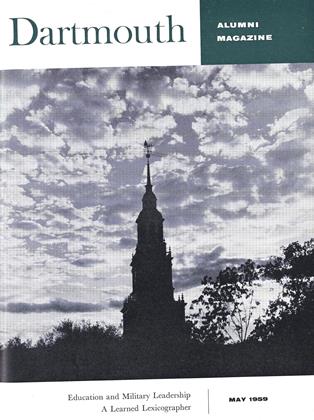Edited by Josephine W.Bennett, Oscar Cargill, and Vernon HallJr. New York: New York University Press,1959• 368 pp. $6.00.
This is a sample of the vaudeville scholars put on to honor an admired deceased or retired colleague, here Karl J. Holzknecht of N.Y.U. The customary descriptive adjective, of course, is "uneven," but I read the book with almost unflagging interest. I think it deserves purchase by all libraries and most Renaissance scholars.
Two articles will have special interest for Dartmouth alumni. Professor Hall, of Comparative Literature, writes about Shakespeare's Julius Caesar. As I remember a lecture on the play by Professor Hall several years ago, he then had trouble, like many before him, deciding who was its hero. The article in this book shows he has found the hero; but it is not Caesar or Brutus, it is Roman virtus. And Julius Caesar, he says, has no political meaning; it is neither pronor anti-monarchical. Though perhaps this makes the play seem duller than if it is viewed as an argument, Professor Hall states his case ably.
Prof. Frederick W. Sternfeld, formerly of Music here, now of Oxford, England, contributes an article about Volpone's song in Ben Jonson's comedy, showing its Latin origins, its relation with contemporary parallels, and its musical form.
Besides, this volume contains discussions of Hamlet, Troilus and Cressida, Romeo andJuliet, Falstaff, acting, A Chaste Maid inCheapside, A Woman Killed with Kindness, and many more. Who, interested in English Renaissance Drama, could resist these topics?
 View Full Issue
View Full Issue
More From This Issue
-
 Feature
FeatureGove (gōv), Philip (fĩl'ìp) B.
May 1959 By JAMES B. FISHER '54 -
 Feature
FeatureDartmouth Study Urges ROTC Program Changes to Meet Nation's Needs
May 1959 By JOHN HURD '21 -
 Feature
FeatureFourteen Gained — Three to Go
May 1959 -
 Feature
FeatureWar Memorial Planned in Center
May 1959 -
 Article
ArticleTHE FACULTY
May 1959 By HAROLD L. BOND '42 -
 Class Notes
Class Notes1915
May 1959 By PHILIP K. MURDOCK, JAMES LeR. LAFFERTY
BENFIELD PRESSEY
-
 Letters to the Editor
Letters to the EditorLetters
January 1946 -
 Letters to the Editor
Letters to the EditorLetters to the Editor
March 1981 -
 Books
BooksPETTICOAT FEVER
October 1935 By Benfield Pressey -
 Article
ArticleHollywood at Work
November 1938 By BENFIELD PRESSEY -
 Books
BooksTHESE WERE ACTORS.
January 1956 By BENFIELD PRESSEY -
 Books
BooksSHAKESPEARE'S POETICS IN RELATION TO KING LEAR.
MARCH 1963 By BENFIELD PRESSEY
Books
-
 Books
BooksLake Unlocked
SEPT. 1977 By CHARLES T. MORRISSEY '56 -
 Books
BooksMASSACHUSETTS PRACTICE. VOLUME 28. CONVEYANCING WITH FORMS.
JUNE 1968 By DOUGLAS L. LEY '35 -
 Books
BooksMichelangelo: the Newdigate Prize Poem
August 1924 By F. L. Childs -
 Books
BooksHORTON HEARS A WHO!
December 1954 By MAUDE D. FRENCH -
 Books
BooksHOP ON POP.
APRIL 1963 By MAUDE D. FRENCH -
 Books
BooksHOSPITAL POLICY DECISIONS PROCESS AND ACTION.
JUNE 1966 By WILLIAM L. WILSON '34


